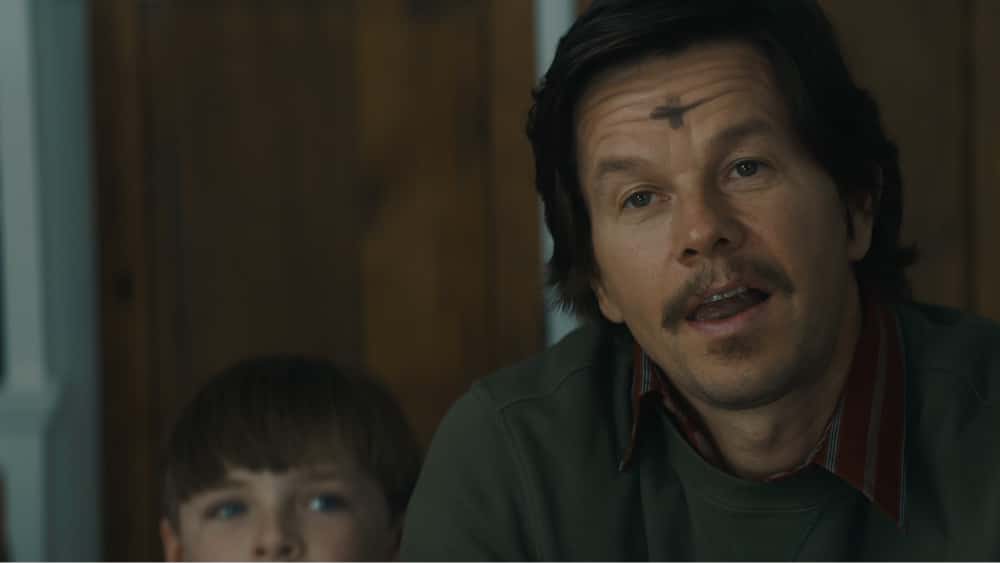It might be easy to believe that a movie named for and based upon the life of a Catholic priest that launches during Holy Week would be the typical sticky-sweet fodder that has given faith-based films a certain reputation. But filmgoers walking into “Father Stu” with preconceived notions of pompous piety will be in for an awakening. The film earns — and is more effective based on the pervasive foul language and grit — its rating for mature audiences.
When Mark Wahlberg learned about the life of Father Stuart Long from a priest friend who pitched it to him over dinner years ago, he initially discounted the story’s film-adaptation potential. Blessedly, he reconsidered the concept and was ultimately impressed by the script penned by Rosalind Ross. Although not Catholic, Ross, who also became the film’s director, tapped into the heart of Long’s checkered past and powerful conversion tale. Independently financed by Walhberg and shot in only 30 days, “Father Stu” offers a plot that should touch not only churchgoers but also those outside organized religions who long for hope and purpose in a world often filled with despair and devastation.
While it takes some liberties with the true story of Father Long’s life, “Father Stu” gets to the heart of what made this story of an unlikely convert called to the priesthood so compelling. We first meet childhood Stu in his ramshackle Montana home, rocking out to Elvis. His dance moves and crooning earn a crude response from his father, Bill Long, portrayed with grizzled brokenness by Mel Gibson. The Long family is eventually decimated by the untimely death of Stu’s young brother, Stephen. Bill takes off for Los Angeles, leaving Stu and his mother, Kathleen (Jacki Weaver), to scrape by as Stu doggedly pursues a boxing career. When a jaw infection forces him to hang up his gloves, Stu heads to Hollywood, convinced that he’ll quickly be discovered for his good looks and charm.
Stu takes a job behind the meat counter at an L.A. market, dreaming that he’s one customer interaction away from stardom. When he spots and immediately falls for Carmen (Teresa Ruiz) as she shops for tuna, Stu tracks her whereabouts with the help of a Lenten flyer she posted in the grocery store. He initially finds himself in the pews at St. Mary’s Catholic Church seeking an affair of the heart. But Stu, determined to win over Carmen, steps up to help teach Sunday school. He even chooses to be baptized and enters RCIA to get the girl he loves. As their relationship develops, a horrible motorcycle accident forever changes the course of Stu’s calling.
It’s in moments such as the bar scene immediately before that crash that “Father Stu” shines in sharing the message at its core without making us feel we’re being preached at. Slamming down shots of booze, Stu engages in an impromptu conversation with a scraggly, long-haired barfly who bears a strong resemblance to a certain itinerant preacher. “Life’s gonna give you a gut full of reasons to be angry, kid,” the stranger warns Stu of a dark path ahead. “You only need one reason to be grateful.”
Stu’s response, an expletive-laden quip, gives the audience a quick laugh before he is mangled in a haunting motorcycle accident scene. Battered and bloody, Stu receives a divine vision, cradled lovingly in Mary’s arms as her tears fall across his face. She whispers to Stu, telling him about her own son, who died for him and for his little brother, Stephen. Even in this moment, Wahlberg’s Stu is never tritely devout.
Stu’s accidental clarion call leads him ultimately to a priestly vocation. He successfully talks his way past the seminary’s skeptical rector, offering a fistful of cash, a handwritten IOU and the argument that the Church needs priests who will “fight for God.” A few years into his studies and having found his stride, Stu takes a bad fall while playing pickup basketball with his fellow seminarians. Unable to stand, Stu is ultimately diagnosed with inclusion body myositis (or IBM), a rare disease that progressively weakens the muscles until they cease to function. Wahlberg’s toned physique radically alters here. The actor underwent a rapid period of medically supervised extreme weight gain to portray Long’s muscular degeneration. Stu’s body may be failing him, but his soul has never been stronger. As we sit alongside the flocks who hear him preach at his former parish and in a men’s prison, Stu’s humble real-world sharing of the Gospel is a balm for world-weary souls.
Reading the obituary of the late Father Stuart Long, it’s easy to find references to the many lives this remarkable man touched, even as he ministered within the walls of a long-term care center that became his final priestly post. “Father Stu” helps us also imagine how his humble love drew those closest to him, his own parents Bill and Kathleen, to love Jesus and to repair their relationship with one another. Stu never shied from a fight. Even as his health declined, he taught his flock and his own family that redemptive suffering can be a powerful life mission.
“All our outer nature is wasting away, but our inner nature is being renewed every day,” Father Stu preaches at his ordination Mass from his wheelchair. “This life, no matter how long it lasts, is a momentary affliction preparing us for eternal glory. We shouldn’t pray for an easy life.”
Rated R for language throughout, “Father Stu” contains graphic fighting scenes, an intense accident, and a hint at premarital relations. When it launches in theaters on April 13, the film will touch hearts and souls through its unflinching desire not to shy away from life’s toughest moments and to always seek God’s grace along the way.
Lisa Hendey writes from California.





